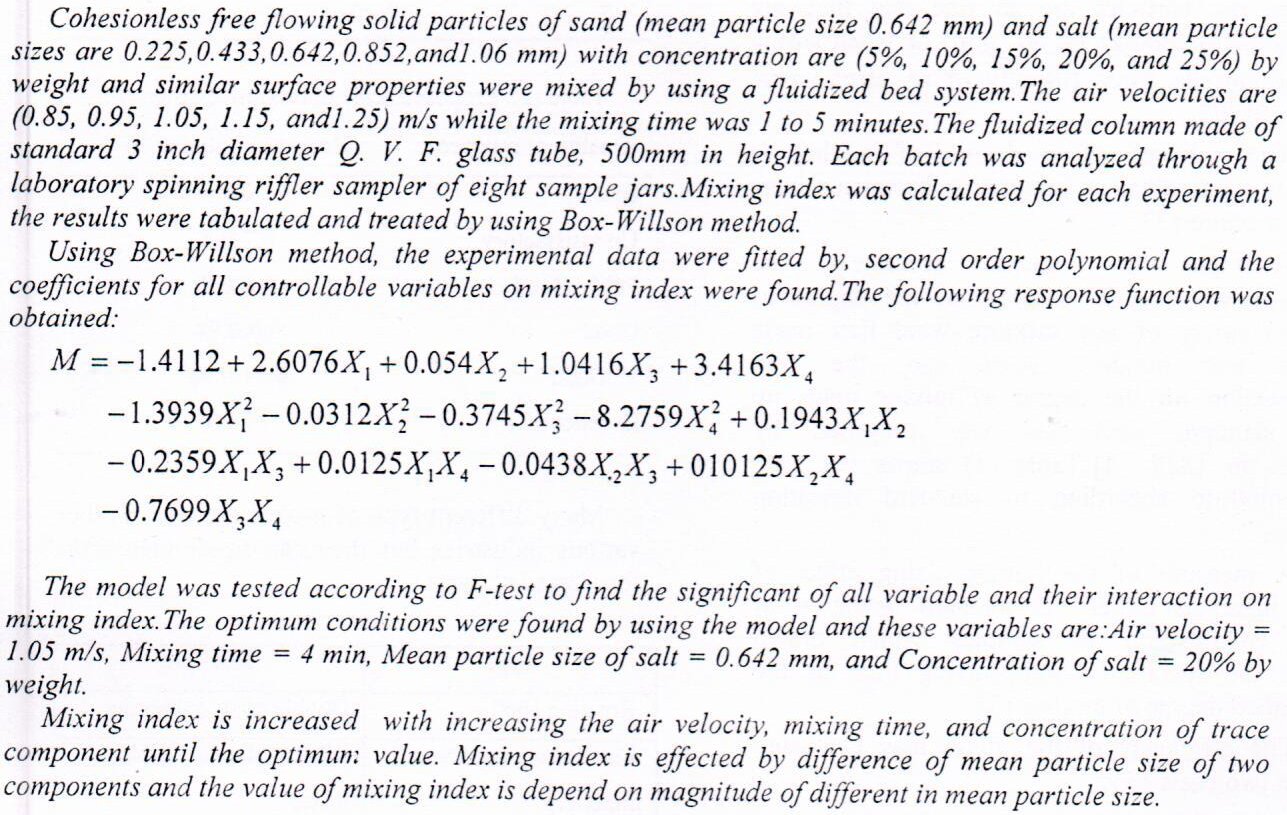
Design and build a center basins new p-type four mirrors were studied its effect on all parameters evaluating the performance of the solar cell silicon in the absence of a cooling system is switched on and noted that the efficiency of the performance Hzzh cell increased from 11.94 to 21 without cooling either with cooling has increased the efficiency of the
ABSTRACT Background: This study aimed to study the effect of some acidic drinks (Vinegars and fresh Orange juice) and energy drinks (Red bull) on surface roughness of three types of bulkfill composite materials: Filtek posterior bulkfill (3M), Sonicfill (Kerr) and Filtek p60 (3M). Materials and Methods: Total number of 120 samples are prepared by using a mold of (12mm diameter and 3mm height), which were divided into three groups forty samples for each group: Group A: Filtek bulkfill posterior composite (3M), Group B: Sonicfill composite (Kerr), Group C: Filtek P60 (3 M) which then divided into four sub- groups (n=10) (1) samples were kept in distilled water as a control group (2) samples were immersed in Redbull (3) samples were immersed
... Show More (3)
(3)
In this research local wheat peel was used as an adsorbent surface for removal of Azure B (AB) dye from the aqueous solution. The adsorption process was performed at different experimental parameters, equilibrium time, temperature, ionic strength and solution pH. The isotherms of adsorption are of H-type as compared with Giles curves and the adsorption data were coincide with Freundlich equation. The adsorption kinetic data were analyzed using pseudo- first and second order kinetic models. The effect of temperature was studied and the amount of dye adsorbed was found to increase with the increasing of temperature from 25 to 50 oC. The values of thermodynamic functions like enthalpy and entropy have been estimated. The quantity of adso
... Show More (2)
(2)
AAA AL-NUAIMY, MH ABDLL-ABASS, Iraqi Journal of Agricultural Sciences, 2007
Background: This study was performed to compare the marginal fit changes and facture resistance of metal ceramic crowns constructed from Ceramill Sintron metal coping veneered with three different porcelain veneering materials (Vita Master Koromikos VMK, Willi Geller Creation CC and GC initial MC), also to evaluate the influence of thermocycling on load at fracture. Materials and Methods: Master brass die was scanned ,then metal coping was designed and milled from Ceramill Sintron blank to get 60 metal copings, then divided randomly into three groups(20 sample), then veneered with porcelain: VITA, Creation or GC. The marginal gaps were measured before and after porcelain veneering then marginal fit changes was calculated. Fracture resist
... Show MoreThere are many diseases that affect the arteries, especially those related to their elasticity and stiffness, and they can be guessed by estimating and calculating the modulus of elasticity. Hence, the accurate calculation of the elastic modulus leads to an accurate assessment of these diseases, especially in their early stages, which can contribute to the treatment of these diseases early. Most of the calculations used the one-dimensional (1D) modulus of elasticity. From a mechanical point of view, the stresses to which the artery is subjected are not one-dimensional, but three-dimensional. Therefore, estimating at least a two-dimensional (2D) modulus of elasticity will necessarily be more accurate. To the knowledge of researchers, there i
... Show MoreThis study was done to find a cheap, available and ecofriendly materials that can remove eosin y dye from aqueous solutions by adsorption in this study, two adsorbent materials were used, the shells of fresh water clam (Cabicula fluminea) and walnut shells. To make a comparison between the two adsorbents, five experiments were conducted. First, the effects of the contact time, here the nut shell removed the dye quickly, while the C. flumina need more contact time to remove the dye. Second, the effects of adsorbent weight were examined. The nut shell was very promising and for all used adsorbent weight, the R% ranged from 94.87 to 99.29. However C. fluminea was less effective in removing the dye with R% ranged from 47.59 to 55.39. The thi
... Show More (5)
(5)
 (3)
(3)
A hierarchically porous structured zeolite composite was synthesized from NaX zeolite supported on carbonaceous porous material produced by thermal treatment for plum stones which is an agro-waste. This kind of inorganic-organic composite has an improved performance because bulky molecules can easily access the micropores due to the short diffusion path to the active sites which means a higher diffusion rate. The composite was prepared using a green synthesis method, including an eco-friendly polymer to attach NaX zeolite on the carbon surface by phase inversion. The synthesized composite was characterized using X-ray diffraction spectrometry, Fourier transforms infrared spectroscopy, field emission scanning electron microscopy, energy d
... Show More (4)
(4)
In this research, the possibility of using waste wooden materials (reed and sawdust) was studied to produce sustainable and thermal insulation lightweight building units , which has economic and environmental advantages. This study is intended to produce light weight building units with low thermal conductivity, so it can be used as partitions to improve the thermal insulation in buildings. Waste wooden materials were used as a partial replacement of natural sand, in different percentages (10, 20, 30, and 40) % . The mix proportions were (1:2.5) (cement: fine aggregate) with w/c of 0.4. The values of 28 days oven dry density ranged between (2060-1693) kg/m3.The thermal conductivity decreased from (0.745 to 0.2
... Show More